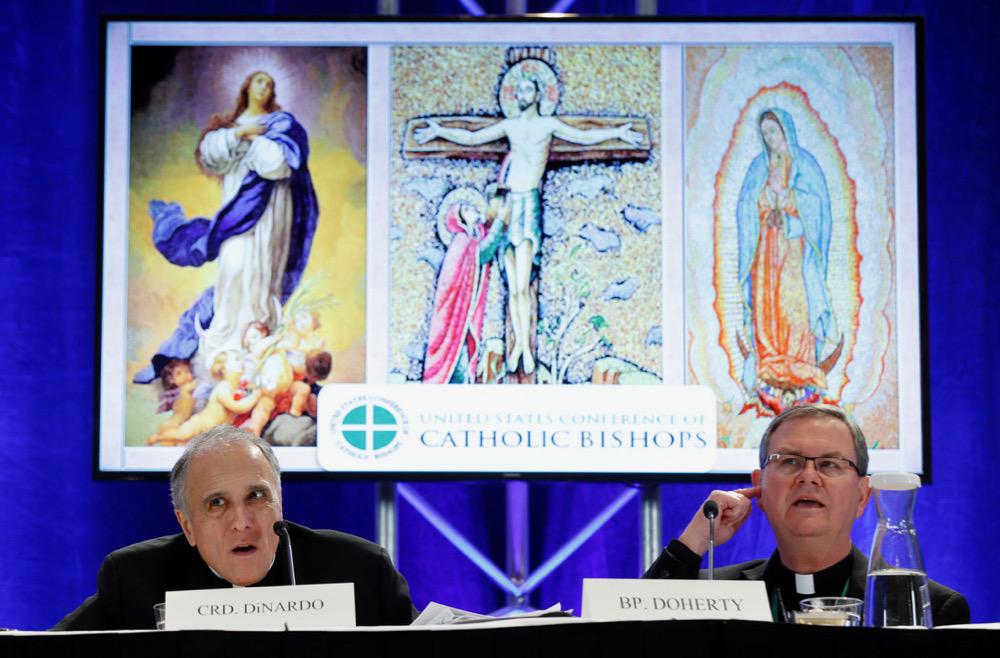|
Conservatives in ascendant at divided US bishops’ plenary
By Michael Sean Winters
Bishops 'who have gotten too accustomed to listening to lawyers over victims' were among those criticised The US bishops’ conference concluded its autumn plenary last week divided and disheartened. After a summer of intense focus on their mishandling of clergy sex abuse issues, they fumbled any attempt to demonstrate a reason the people in the pews should trust them to lead the ecclesial community. The Holy See had issued a last minute directive, barring them from enacting the proposed remedies formally, pending the outcome of a Rome meeting in February with the presidents of the world’s episcopal conferences. The executive committee proposed “Standards of Episcopal Conduct”, and a National Review Board to investigate charges against bishops. But, when they discussed those proposals with a view towards instructing their president-delegate to that same meeting, it quickly became clear that the bishops found them inadequate, too expensive, and too cumbersome. They did not even take a “sense of the body” vote on the proposals as was suggested by Cardinal Blase Cupich when the Vatican’s decision to bar a vote on enacting the proposals was announced. Nor was there any consensus on diagnosing the problem. Archbishop Salvatore Cordileone of San Francisco commended a study purported to link increased numbers of gay people in the priesthood with clergy sex abuse and Bishop Joseph Strickland, of Tyler, Texas, criticised Fr. James Martin, S.J., without naming him, for his efforts to encourage outreach to the LGBT community. Sex abuse victims’ groups have repeatedly denounced efforts to blame the abuse crisis on gays and the most thorough study of the sources of the crisis, published by the John Jay College in 2011, cited a variety of factors that led to the crisis but insisted homosexuality is not a predictor of sex abuse. Archbishop Paul Etienne of Anchorage, Alaska pointed to the culture of clericalism. He criticised bishops “who have gotten too accustomed to listening to lawyers over victims” and those too concerned with power, privilege and pride. “That’s a corruption of our life as shepherds that has to be called out and say ‘No more. It’s not tolerable.’” The lack of consensus and mixed motives were evident in the debate over a proposal by Bishop Earl Boyer of Lansing, Michigan. Boyer proposed a resolution urging the Vatican to publish all documents related to the scandal surrounding former Cardinal Theodore McCarrick. Cardinal Joseph Tobin pointed out the Vatican is already conducting an investigation and has promised to publish the results. The proposed resolution was defeated two-to-one. In the elections for new committee chairs, the bishops selected mostly conservative candidates including two bishops who had spoken out in the wake of the “testimony” published by former nuncio Archbishop Carlo Maria Vigano this summer, attesting to Vigano’s integrity without affirming any support for the pope, or attesting to Francis’ integrity. Archbishop Cordileone was elected to chair the Committee on Laity, Marriage, Family Life and Youth, and Oklahona City Archbishop Paul Coakley was elected to chair the Committee on Domestic Justice and Human Development. The election of Archbishop Etienne to lead the National Collections Office and of Auxiliary Bishop Mario Dorsonville of Washington, D.C. to head the Committee on Migration were the only two victories for candidates seen as supportive of Pope Francis.
|
.
Any original material on these pages is copyright © BishopAccountability.org 2004. Reproduce freely with attribution.
